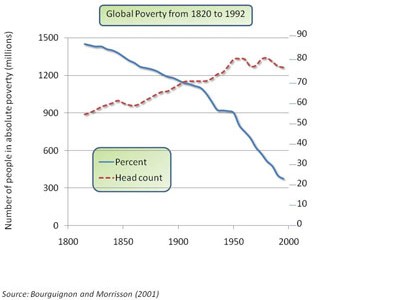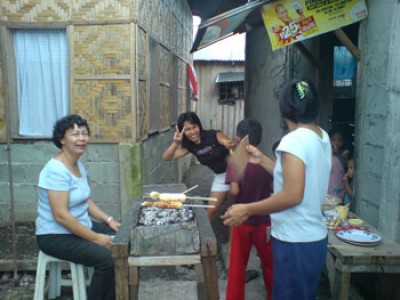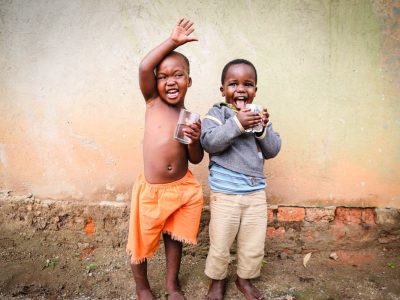11 Tips to Effectively Speak on Behalf of Children in Poverty
These tips come courtesy of Shaun Groves, learned from his personal experience as a speaker on behalf of children in poverty, figuring out what works and what doesn’t … usually.
They are relevant whether you’re speaking in front of a crowd of thousands or to one person in an elevator.
They are as true for persuading people via Twitter, blogs or Facebook as they are for concerts and festivals.
A Solution for Infant Mortality
Think about it for a second. A birthday may be the most special day in a little kid’s life. Yet nearly 9 million kids a year never make it to their fifth birthday.
A Water Wake-Up Call
![]() Ninety-nine percent of the time, I get ready for my day after my 6½-year-old goes off to school. My 15-month-old daughter takes her morning nap around this time, and my 3-year-old plays on starfall.com. It just works better this way.
Ninety-nine percent of the time, I get ready for my day after my 6½-year-old goes off to school. My 15-month-old daughter takes her morning nap around this time, and my 3-year-old plays on starfall.com. It just works better this way.
But for whatever reason, one morning last month I woke up early — too early in my opinion, and I could not fall back asleep.
“Might as well get up,” I thought. So, I got a shower in and, wouldn’t you know, not 10 minutes after I stepped out, I hear a loud “CHUG CHUG CHUG!” coming from my cellar.
I ignored it (mainly because I don’t like going into the cellar) and went to brush my teeth. No water.
CHUG CHUG CHUG.
Great.
After mustering up my courage, I ventured down into the cellar where I could hear the pump or softener making a loud racket.
Now, I’m not a Mrs. Fix-It by any means, but I did know that I should probably turn off the breaker so whatever it was wouldn’t burn out. (Pat myself on the back …)
My husband told me to call the plumber, and thankfully by 3:30 that afternoon, the plumber had dug up our well and found that the iron in the water had corroded part of the well pump pipe (or something like that), which caused the pump to stop pumping the water up.
Purely maintenance, but I was happy the problem was solved. To a degree anyway.
I was informed that I was not to use the water for a couple days so that the filter could go through a few cycles to clean the water.
“Roughly 12 percent of the world’s population, or 884 million people, do not have access to safe water.”
“Yeah, okay, no problem,” I thought, but I soon realized that I use water for way more things than I thought:
- brushing my teeth
- taking a bath or shower (which I had to chuckle at, because God made sure I was up before this little event happened … am I that bad before I shower?)
- rinsing off the dishes
- running the dishwasher
- running the washing machine
- cooking
- ice
- flushing the toilet — which was okay to do after they fixed the pump, the water was just a murky gray.
- washing my hands
“Diarrheal diseases can be reduced by more than 40 percent through the simple practice of washing hands with soap and water.”
“The average person in the developing world uses a little more than 2.5 gallons of water each day for drinking, washing and cooking. Whereas the average person in the developed world uses 13 gallons per day only for toilet flushing. “
My “water poverty” problem lasted only a few days and just required some simple adjustments to our lifestyle. My husband picked up several gallons of water on his way home from work, which allowed us to continue in a fashion pretty close to normal. But as I waited for him to get home with the water, I stood in my house — and I broke down.
What about my sponsored children?
Where do they get their water?
How far do they have to travel?
Is it clean?
“Water-related diseases are the second biggest killer of children worldwide. This is around 5,000 deaths a day.”
Sources: www.who.int, www.wateraid.org, www.unicef.org
Catalyst 2009: It Could Have Been Me
Catalyst 2009 – When I watch the video, I see that this could have been me in different circumstances. I see that this can be my sponsored child.

The Ability to Eliminate Extreme Poverty Is Just a Matter of Priorities
The Church’s ability to eliminate extreme poverty is just a matter choosing to do so. We used to say that 40,000 children under age 5 die every day of hunger or preventable diseases. Today, that number is 24,000. These statistics show that in 20 years the number of children who die every day of hunger or preventable diseases has been cut in half. Yet, the birth rate is actually going up. The population is increasing.
Give Up On Serving the Poor?
I read a blog post the other day that I want to share with you. It’s titled Why I Stopped Serving the Poor, and it was written by Claudio Oliver of Curitiba, Brazil. His grandparents founded the Salvation Army in Brazil.
“Without exception, rich and poor have the same conviction that what they need is something that the market, money, the government or some other agency can offer them.”
I don’t remember how I stumbled across his post, but I do know it rocked me to the core. And it’s a pretty timely subject since Saturday is the International Day for the Eradication of Poverty.
“The only way to remain with the poor is if we discover that we are the miserable ones. We remain with the poor when we recognize ourselves, even if well disguised, in him/her who is right before our eyes. When we can see our own misery and poverty in [the poor], when we realize our own needs and our desperate need to be saved and liberated, then and only then will we meet Jesus and live life according to His agenda.”
Pretty much every word I read resonated deeply within me. It was refreshing to hear a Christian talk in such a counter-cultural way about poverty.
“Jesus doesn’t have any good news for those who serve the poor. Jesus didn’t come to bring good news of the Kingdom to those who serve the poor; he brought Good News to the poor. He has nothing to say to other saviors who compete with him for the position of Messiah, or Redeemer.”
The thing that struck me most was the author’s humility. He speaks about his own journey with a transparency that gives credence to his words.
“Over the years I’ve discovered that the very position of serving the poor from a commitment to “liberate” them, has been filled with a sense of superiority.”
I have been racking my brain for days trying to come up with a way to get you interested enough to read the post. After many abandoned attempts, I decided to just take the direct route.
You should read the article, Why I Stopped Serving the Poor. I promise … it will be worth your time.
“I have given up on serving the poor. I’m going back to encountering the poor and finding myself in them.”
The Ability to Eliminate Poverty: Is It Just a Matter of Interpretation?
Is our ability to eliminate poverty just a matter of how we interpret the Bible? John 12:7-8 is the verse that has captured our thoughts as we think about the poor. The verse that is now the most remembered about the poor.
And yet, when Jesus spoke, he was not talking to us. His use of “you” was not intended to be directed at us. This reference, this statement, was very specifically directed at Judas.
Child Sponsorship: Life After Graduation
Tulancingo is located in a semidesert valley in central México. The view is beautiful and green with big cactus trees standing on the horizon.
The area of Tulancingo holds great history from the ancient Toltec and Otomi cultures. Although the inhabitants are mostly dedicated to farming and agriculture, a few other industries are also in the community. Their major products are dairy, meat, maize, barley and vegetables.
Tulancingo is the community where Proyecto Hormiga has worked with the support of Compassion México for more than 10 years now. They serve nearly 170 children from the community and have raised many children in their classrooms.
Most of the children here come from families with single moms or with parents who work either on the farm, as masons or in the nearby fields. The salaries are too small and the money earned to support the families is not enough.
The Compassion program has been a real blessing in the lives of these children; for most of them it means the opportunity to study beyond elementary school.
In the last year the student center graduated 15 teenagers in two different ceremonies where all families, children and staff recognized the success of these youngsters who have been considered “the pride of the program.”
We interviewed and visited some of them in their new activities. (more…)

Would You Immerse Yourself in Extreme Poverty to Get a Job?
You know when you go on a mission trip that is a completely life-changing experience, and you come back all fired up? You just stared injustice in the face and realized you can actually do something about it. Your life takes on new purpose. You know that feeling?
Philippines Milestone: 50,000 Registered Children
“Why just now?” asks Pastor Joel. “Where was Compassion when I was just a child who had all the potential but did not have the money to go to school or to eat three square meals a day?”
Pastor Joel grew up on the remote island of Siquijor in the Philippines, which has long been known for magic and witchcraft, but Compassion in the Philippines only began partnering with churches in Siquijor this year.
Although Compassion reached the Philippines in the 1970s, we finally landed in the isolated island after 30 years!
In 2004, we began regularly updating our strategy map to identify the poorest and neediest provinces in the country with the fewest number of evangelical churches, and the list included Siquijor. (more…)
Submissions Wanted for Compassion Kids’ Magazine
Last week we asked if you’d be interested in receiving a Compassion magazine for kids ages 8 to 12. Many of you said, “Absolutely!”
Because of your responses, we’re moving forward and mailing our first issue this January.
And now, we’re inviting your kids to submit the following materials for a chance to be published in the magazine.
We’d like your kids to:
- Write about something special they did for their sponsored child.
- Tell about a letter they received from their sponsored child. Or share pictures.
- Describe what they have learned from their sponsored child. For example, what kinds of homes do the children live in? What do they eat? What games do they play? What are they learning in school?
- Write a poem or draw a picture related to poverty and tell us what it means to them.
- Tell about creative ways to write to their sponsored child.
- If they have a recipe or craft from a country where Compassion works, send it our way.
- If they’ve visited their sponsored child, we’d love to hear the stories and see the pictures.
You can e-mail your materials to [email protected] or mail them to:
Compassion International
Attn: Magazine Editor
12290 Voyager Parkway
Colorado Springs, CO 80921
We’re excited to bring you this new magazine and excited to see the great material your kids will submit!

Funny Things Kids Say
What puzzling, quirky, amusing things have your sponsored children written in their letters to you?


